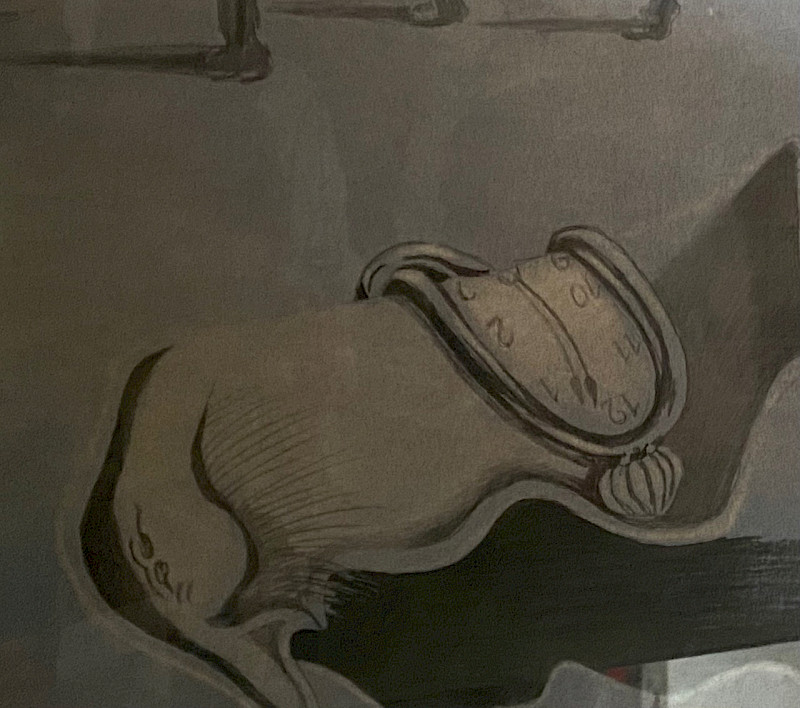„So it is – the life we receive is not short, but we make it so, nor do we have any lack of it, but are wasteful of it.” (Seneca: De brevitate vitae. I,4)
Whether you’re strolling leisurely alongside a beautiful beach, are immersed in reading a book or taking an exam, a certain amount of time has elapsed that is gone forever. How come that we might spend for example 45 minutes for walking, reading or thinking, but we do experience this same amount of time differently? What has our feeling of time to do with time itself? And why do we often feel pressed for time? And more importantly: what is time?
Einstein once said that time is what the clock says. So, does that mean that time is exactly the same no matter where I am? Einstein’s answer in his Special Theory of Relativity is sadly “no” as time is a fourth dimension by locating the object’s position at a particular time. Space and time are thus inextricably linked to each other.1 Furthermore, time is depending on an object’s relative speed and proximity to a mass. This explains why mechanical watches are not always measuring time precisely due to the movement of the bearer and the earth’s gravity.
„Time is a number of changes with respect to the before and after.” (Aristotle: Physics IV, 11, 219b1-2)
In a nutshell, time is relative with Einstein, local with physics and to be wisely used with Seneca (Brevity of Life). But what is it really? Is it a quantity (Ingeborg Bachmann’s poem “Die gestundete Zeit”) or a quality (Augustine and Heidegger)?2 There are two ancient Greek words for “time”: χρόνος (lat. tempus) and καιρός (lat. occasio). Whereas the first describes the quantity of duration as the measured time, the latter describes the qualitative aspect of time as the “right or appropriate moment” and serves thus as a situational determinant. This conception of time as καιρός addresses an important aspect of time that is often overlooked: it is valuable as it opens a certain frame of time, in which good things can be realized in an appropriate and effective manner. What do I mean by that? Well, there is a right time for action that won’t come again. Once you missed it, it’s gone forever. This could be a missed opportunity to make peace with someone that suddenly is no more or a situation you witnessed in which someone came under duress and you didn’t react quickly enough to help. You didn’t seize the moment that is then gone. It might be best shown as a medical καιρός: the physician is under some pressure for time when diagnosing his patient without much temporal leeway. Once the patient’s conditions change, there need be a plan in action to help him in time to heal properly or even to survive. These windows of time open and close. To seize them, is using the καιρός wisely and doing good.3
“Every καιρός is a χρόνος, but not every χρόνος is a καιρός.” (Corpus Hippocraticum)
As a philosopher, I tend to time as a quality since humans perceive time broadly by involving the senses. It is more than a simple arrow of time4 between event A (past) and event B (future). Why? Simply because we live our life in it. Time gives meaning to our life. Thus, humans can “feel” time even though we don’t possess a particular sensory organ for it such as our eyes for seeing. On a phenomenal level, we perceive time through our emotions and hormones.5 This would mean that physicalness (as some kind of an inner clock) and emotions (as a pattern or construct of different physiological components such as bodily or behavioural reactions) do play a vital role in our perception of time. But that means that there is a distinction to be made between “Weltzeit” (social dimension of time) and “Eigenzeit” (subjective dimension of time)6. The neuroscientist and Nobel laureate Edvard Moser showed that the signature of time in a person’s subjective experience belongs to a different kind of temporality than the signature of time in standardised time of seconds, minutes or hours. Could this distinction explain why we often feel pressed for time? As if the ticking by of minutes on our watch is much faster than what our body tells us and thereby feeling rushed and under pressure to get things done in time.7
Thus, time can be an illusion when it comes to the subjective perception and estimation of time compared to the actual duration of an event. How we feel seems to determine our sense of time. What is time then? Time is relative, local, smooth, continuous, relentless and perceptible, but neither philosophy nor physics have agreed on a definite concept for this conundrum called “time” yet or as Thomas Mann beautifully put it in The Magic Mountain:
„What is time? A mystery, a figment – and all powerful.” (Kap.6)
